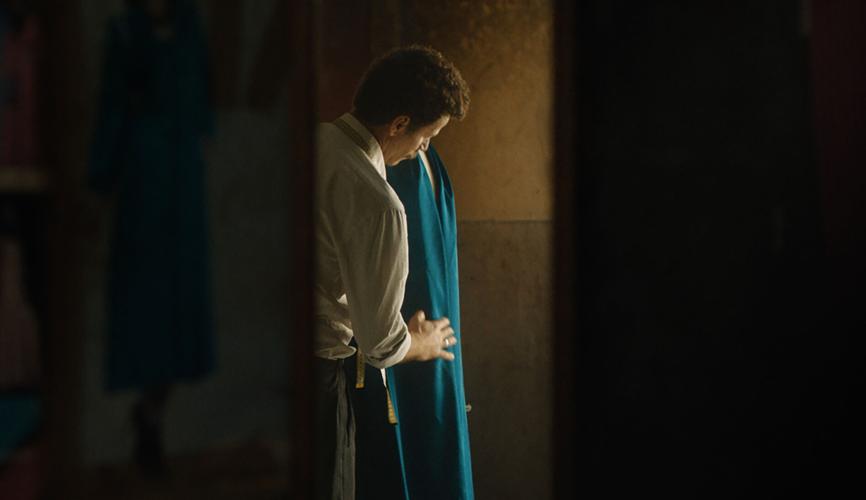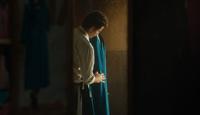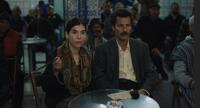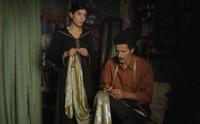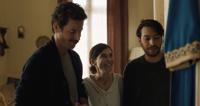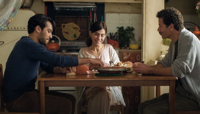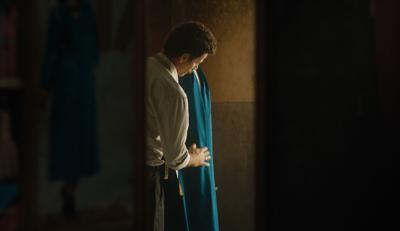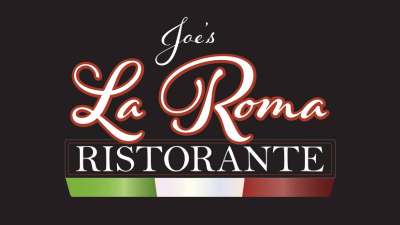The official submission from Morocco to the 95th Academy Awards made the shortlist, but it didn't get the nomination. However, the fact that Morocco selected this film is strange. It's strange given that the country is one of a few nations that still has homosexuality as being illegal and gay people having absolutely no rights. This film comes about a decade since Salvation Army, the film by Abdellah Taïa, the openly gay Moroccan filmmaker whose debut premiered at the 2013 Venice Film Festival. Taïa's film was a coming-of-age story for a gay teenage boy in Morocco, as he eventually works to flee his home country, knowing he could never truly be free there, free to be himself.
This film, written and directed by Maryam Touzani, isn't about a teenage boy but instead a middle-aged man. It isn't about him trying to escape Morocco. It's instead about him staying and building a life, not necessarily one that he wants, but one with which he's become comfortable, if not totally happy. It's about acceptance of homophobia and how people navigate same-sex attraction in a place where it can't even be spoken or even hinted. It's akin to this Henry David Thoreau idea of men leading lives of quiet desperation. Emphasis is on the fact that Touzani's film is very much quiet and slowly paced.

Saleh Bakri is a Palestinian actor in his mid 40's. He was in the Oscar-nominated short film The Present (2020). He was also in the highly acclaimed, Israeli film The Band's Visit (2008). Here, he plays Halim, a Moroccan man who lives in Salé, a city on the coast of the Atlantic Ocean, about a hour north of Casablanca. Halim has a small, clothing shop in the center of town and he works as a tailor. He specializes in making caftans, hand-sewing and embroidery for them. He's such a specialist that he's known as "maalem," or a "master" in Morocco craftsmanship.
Because he doesn't use a sewing machine or any electronics, and stitches everything by hand, it takes him a long time to work on pieces. It takes him six weeks to a couple of months to finish one garment, which frustrates his customers. He had employees to help him due to his backlog of orders, but his employees quit after they too become frustrated with the time and possibly lack of pay. Currently, Halim is working on the titular object, which is going even slower than usual, and the time it takes him to finish it is also the length of this narrative.

Lubna Azabal is a Belgian actress of Morocco and Spanish descent. She's been in a ton of international features, ones officially submitted to the Academy Awards. A couple of which have even been nominated, including Incendies (2011) and Paradise Now (2005). Here, she plays Mina, the wife to Halim. She works with him at the tailor shop. She takes the orders and likely does the bookkeeping with some seamstress duties thrown in as well. She and Halim seem to have a good relationship, having likely been married for decades.
The two of them don't have any children, or at least none of which they speak. It's possible they have adult offspring who don't live with them any more and that have moved away. However, it becomes clear that Mina is sick and possibly has some terminal illness. If she did have children, for them not to show up for her dying days would be horrible for a myriad of reasons. The likelihood is Mina and Halim have no offspring, and there's a possible explanation as to why.

Ayoub Missioui, in his feature debut, plays Youssef, the apprentice who is the latest and the only employee at Halim and Mina's shop. Unlike the other employees, Youssef appears to be genuinely interested in learning from Halim and perhaps becoming a "maalem" himself. We learn nothing else about Youssef except that he has same-sex attraction. He might in fact be gay.
It becomes obvious that this film is about the quiet and private moments that Halim and Youssef can steal together. The trick of this film is the fact that Mina might not be excluded from those private moments completely. It's revealed early and in subtle fashion that Mina is aware of the attraction between the two men. At first, it seems as if she's opposed or perhaps jealous, but, as the film progresses, it seems as if she becomes encouraging of their attraction to one another. In one short but critical scene, a police officer approaches her and asks for them to prove their marriage. She is perhaps aware of the penalty if her husband is discovered to be gay, so she knows of his quiet desperation.

Touzani's film also is a lot about the craft of tailoring and working with textiles and fabrics. Her feature is a bit of a love letter to embroidery and especially embroidery by hand, which is seen as a dying art. The camerawork makes us feel the textures and luxuriate in the colors and patterns. The film is sumptuous in that regard.
Not Rated but for mature audiences.
Running Time: 2 hrs. and 2 mins.
Available on DVD and VOD.

